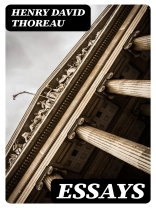In ‘Essays, ‘ Henry David Thoreau presents a collection of profound reflections that capture the essence of 19th-century American transcendentalism. With a style characterized by lyrical prose and philosophical depth, Thoreau explores themes such as nature, individuality, simplicity, and societal critique. These essays, ranging from the well-known ‘Civil Disobedience’ to meditative pieces on nature and self-reliance, articulate a compelling vision of living authentically and in harmony with the natural world, challenging contemporary norms and encouraging readers to ponder the significance of their existence within the broader tapestry of life. Thoreau, a pivotal figure in the transcendentalist movement, was profoundly influenced by his experiences in nature and his philosophical conversations with contemporaries like Ralph Waldo Emerson. His commitment to simplicity, nonconformity, and deep ecological awareness stemmed from both personal conviction and social circumstance. Thoreau’s time spent living in a cabin at Walden Pond became emblematic of his belief in living deliberately and purposefully, which permeates the essays in this collection. Readers seeking both inspiration and intellectual engagement will find Thoreau’s ‘Essays’ a powerful exploration of self and society. This collection not only invites readers to reflect on their relationship with the world around them but also challenges them to confront the moral complexities of their actions. Thoreau’s work remains deeply resonant, offering timeless wisdom that encourages a profound connection to nature and a critical examination of modern existence.
Giới thiệu về tác giả
Henry David Thoreau (1817–1862) was an American essayist, poet, philosopher, abolitionist, naturalist, and historian. As a leading transcendentalist, Thoreau is best known for his book ‘Walden’, a reflection upon simple living in natural surroundings, and his essay ‘Civil Disobedience’, an argument for individual resistance to civil government in moral opposition to an unjust state. His literary style combines natural observation, personal experience, pointed rhetoric, and symbolic meanings. Thoreau’s works are a staple in American literature courses and remain influential to environmental movements and civil rights. Beyond ‘Walden’, Thoreau’s numerous essays, collected and published posthumously, explore a range of topics from nature to politics. His essays embody the transcendentalist faith in the individual’s ability to transcend materialistic society through personal intuition and the contemplation of the natural world. Thoreau’s work is marked by a profound respect for nature and a deep skepticism towards institutional authority, characteristics that reveal the timelessness of his writing and its continued relevance in contemporary discourse on conservation and civil liberties. His work resonates with the ethos of American romanticism and stands as a testament to the enduring power of individual conscience and introspection.












